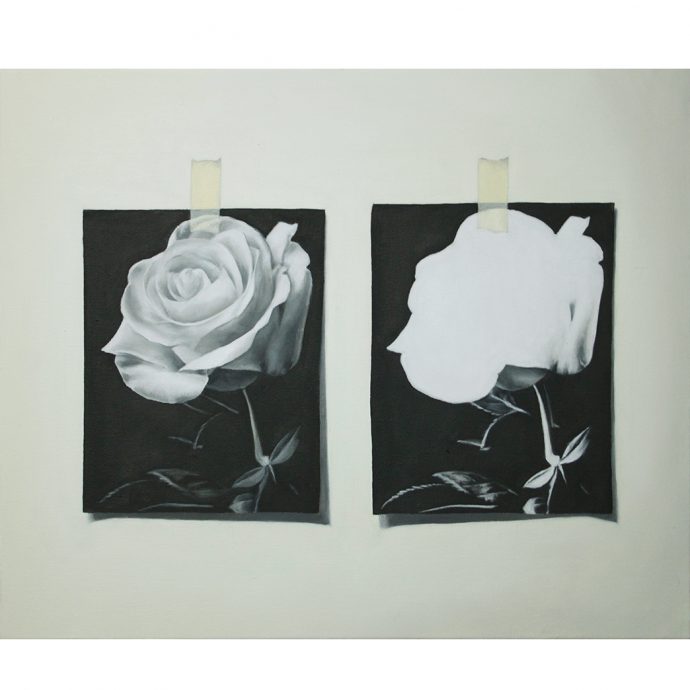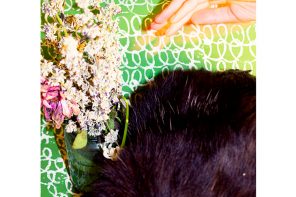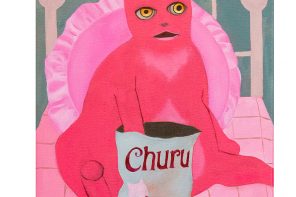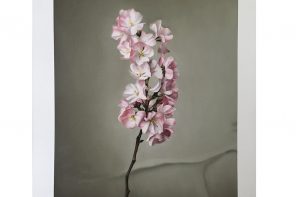FROM “THREE DEMONS”: SERIES I
Noble Eyes around the pyre, pillar of fire rockets to the stars. Tipsy Crabs skittering about— I squint at the rainbow fading. Petals Spring light— sap puddles on the earth beneath. Line Rooftop— lightning glitters on the flesh of noble ladies.
“THREE DEMONS”: SERIES VIII
Bunched on the sod, Slowly but surely the clouds and wheat stalks stretch their bodies POWs Green plums, the babies crying in the dark hugging their knees
emerald green
persimmons:
no lamps
A shepherd
lifts his staff,
to chop clouds
on the arid
meadow
Below spring—
finely
carved, trampled
by
a rainbow
lightning forks—a queue of ice blocks form Starry, muggy rain front— a telegram Between eye- brows and eyes: snowfall and reads: clouds “Forgive me” Bury your comrade-in-arms, shoot a pistol at the gods
From the following collections:
旗 (1940) – Flags
今日 (1952) – Today
変身 (1962) – Transformations
月下匂う残業終えし少女の列 (変身)
誰も見る焚火火柱直立つを (今日)
蟹と居て宙に切れたる虹仰ぐ (今日)
春の昼樹液したたり地を濡らす (今日)
屋上の高き女体に雷光る (旗)
高原の蝶噴き上げて草いきれ (変身)
野良犬よ落葉にうたれとび上がり (変身)
北風に重たき雄牛一歩一歩 (今日)
霜焼けの薔薇の蕾に飛行音 (変身)
崖下のかじかむ家に釘を打つ (今日)
びしよぬれの雪塊浮べ黒き河 (変身)
冬の山虹に踏まれて彫深し (今日)
寒の中コンクリートの中医師走る (変身)
雪山に雪降り友の妻も老ゆ (今日)
寒夜明け赤い造花が又も在る (変身)
Three Demons, from which the above is excerpted, is a full-scale work divided into sequences (called “Series”), each of which adheres to a different set of visual rules. These rules and the patterns that follow from them are creative insertions that don’t exist in the originals. My translations—ideally, poems as original as the originals themselves—function both as word-paintings and traditional poetic texts. For the sake of flow, I also opted to discard the 5-7-5 syllabic rule that famously governs haiku—whenever the rule does occur, it’s by chance alone, insofar as chance is possible in such a work of determinate nature. Despite this liberal approach to meter and the layout of the page, I attempted to stay faithful throughout to the facts of the original images.
Sanki Saitō (1900-1962), born in Tsuyama, Japan, was one of the leading figures in the gendai haiku movement of the 1930s. Celebrated by the anti-war poetic movements and reviled by the ultranationalist regime, Sanki began writing in his thirties while practicing dentistry at a hospital in Tokyo and was imprisoned for his poetry at the height of the Second World War. His poetry collections are: Flags (1940), Night Peaches (1948), One Hundred Haiku (1948), Today (1952), and Transformations (1962). “Sanki” is a nom de plume that means “Three Demons.”
Ryan Choi is the author of the forthcoming book In Dreams & Other Stories: The Very Short Works of Ryūnosuke Akutagawa (London: Paper + Ink, 2021). His work has appeared or is forthcoming in Fiction, Harper’s, The New Republic, The White Review, and elsewhere. He lives in Honolulu, Hawaiʻi, where he was born and raised.
Translation Series curated by Jae Kim.




